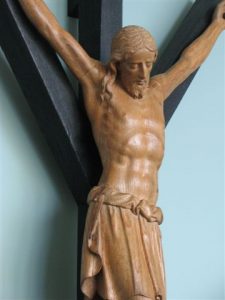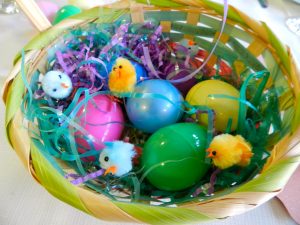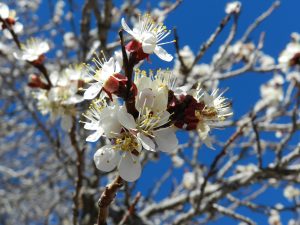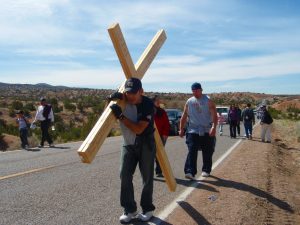Athletic events bring out signs to remind us that “God so loved the world” (John 3:16). The Greek word in Scripture is kosmos. God so loved the cosmos. If we are to love as God loved, then our love must be immense reaching far beyond Planet Earth. And scientists are telling us that the universe is expanding. So my love must expand. What can I do today to expand my love? Will I remember people living hundreds of miles away in my prayer? Will I be mindful of the closeness of all humanity when I breathe in air that was in China two weeks ago? Will I be careful of earth’s precious resources? If I’ve been too myopic, now’s the time to throw out the first pitch to a new ball game of “Love the Cosmos.”
 As I listen to today’s first reading from the Acts of the Apostles and hear of Saul’s conversion, I’m reminded of the difference one person can make in my life and the choice I have in allowing that change to happen.
As I listen to today’s first reading from the Acts of the Apostles and hear of Saul’s conversion, I’m reminded of the difference one person can make in my life and the choice I have in allowing that change to happen.
Saul certainly knew of Jesus. In fact, he dedicated his life to eradicating anyone who claimed to be a follower of Jesus. It was only when he encountered the person of Jesus and came to know Him that he came face to face with a choice. Would he remain driven to eliminate Jesus or be drawn to proclaim Jesus and His love to the world? My deepest fears leave me feeling driven; my deepest desires find expression in my being drawn toward the object of my desire.
Saul chose to respond to the invitation of Jesus to be drawn into the mystery of His love and goodness. Will I?
 As I listen to today’s Gospel story of the multiplication of the loaves and fish, I am challenged again to reflect on who the hungry in my world are. It seems Jesus is calling the apostles to be aware of the hungry right in front of them and do something about their hunger. I imagine the apostles might feel a bit overwhelmed and inadequate in the face of five thousand (!), but Jesus assures them He can use what they bring to work miracles.
As I listen to today’s Gospel story of the multiplication of the loaves and fish, I am challenged again to reflect on who the hungry in my world are. It seems Jesus is calling the apostles to be aware of the hungry right in front of them and do something about their hunger. I imagine the apostles might feel a bit overwhelmed and inadequate in the face of five thousand (!), but Jesus assures them He can use what they bring to work miracles.
While we all “feed the hungry” in various ways throughout our days, some of our Sisters are directly involved with providing food for those in need. Sister Mary Susanna Weaver helps once a week at the local food pantry. She helps to distribute food, clothing and toys to families who are eligible for assistance. Her outreach enables many to eat who might not otherwise be able to do so.
So, who are the hungry ones I will meet today? How will I allow God to use my gifts to feed them?
 Isn’t it interesting that commercial after commercial on TV suggests ways for us to rid ourselves of heartburn, let alone multiple other physical maladies and inconveniences? Yet, the sense in today’s Scripture reading and those throughout this Easter season seems to be that of nurturing the inner flame and fueling the fire!
Isn’t it interesting that commercial after commercial on TV suggests ways for us to rid ourselves of heartburn, let alone multiple other physical maladies and inconveniences? Yet, the sense in today’s Scripture reading and those throughout this Easter season seems to be that of nurturing the inner flame and fueling the fire!
The disciples on the road to Emmaus are weary, discouraged and ready to quit when suddenly Jesus walks with them and sets their hearts on fire! Mary Magdalene in the garden is beside herself with grief when Jesus calls her name and reignites her hope and passion. The apostles in the upper room are in hiding out of fear when the Spirit of Jesus descends on them in tongues of fire, and nothing will keep them from proclaiming the truth of the resurrection!
Perhaps we need to be open to fueling the fire within through Word, Sacrament and the Presence of Jesus in our midst.
I just returned from a magnificently joyful Easter Vigil at a vibrant church in Santa Fe. Two young girls were baptized this evening and they obviously practiced their “I do” to the Profession of Faith with zeal and vigor! The pastor, an energetic man, alerted the rest of us, when it was our turn to renew our Profession of Faith, that we were to be louder than the two girls: “Let’s drive the devil straight out of this building tonight, shall we?!” The result was an explosion of “I DO” in response to each statement. The place was on fire! Smiles everywhere!
Death has lost its sting … the long wait is over … Resurrection has come … Christ Easters in each one of us! Alleluia IS indeed our song! Let’s sing it loud and clear! Let’s spread the joy of knowing Christ! Let’s spread the Easter gift of peace! Let’s join with all creation in giving praise to our God on this festival day!
Amen! Alleluia! Happy Easter!
A couple decades ago, Christian songwriter Michael Card graced the world with a marvelous song called Come to the Table. Every Holy Thursday I take time to ponder its meaning.
“All have been welcomed to come if they might … he freely offers … we freely receive … the hand that is breaking the bread soon will be broken … he’s lived his life for them all … Come to the table he’s prepared for you … the bread of forgiveness, the wine of release… come to the table and sit down beside him … the Savior wants you to join in the feast!”
Jesus makes no distinctions. He invites them all. Judas, who betrayed him. Peter, who denied him. I, who …. We, who …. All are invited to join in the feast, to receive the bread of forgiveness, the wine of release. He grants us a pardon of peace.
And so, my annual Holy Thursday reflections invite me to ponder these questions:
- Are “all” truly invited to my table? The tables around which we Christians gather?
- Do I / we exclude anyone from the table?
- What makes it reasonable for me / us to act as “judge” and to exclude others when Jesus welcomes all to receive the bread of forgiveness and the wine of release?
- How deeply do I love the “all” God has placed before me in family … in community … in ministry … in my job?
- Who will join in my feast this Eastertide?

Happy Holy Thursday! Receive the bread of forgiveness, the wine of release!
I’m gluten / lactose / soy free for medical reasons. This means I can’t always enjoy the same foods that others might be able to eat. Yesterday a phenomenal thing happened. I walked into our monastery kitchen and our generous cook said to me, “Sister, I made you a cake.” “Me?” “Yes … and you can eat it!” This lovely creation graced the steel counter top and I gazed at it in some wonder. “No special reason,” she said. “It’s just you don’t get to eat all the desserts I make for the others so I decided to bake you a cake!”
Have you ever had someone grace you with a spontaneous and unasked-for gift in this way? In the midst of some trying days, this loving gift was treasured all the more. I shared some generous slices with a couple of staff persons and enjoyed a piece myself. I was touched by the baker’s tender regard and her sensitivity to my health needs.
For Christians, this is the holiest week of the year as we join to remember Jesus’ suffering, death, and resurrection. Jesus’ self-gift is the best gift of all. It’s as if he says to us, “No special reason. I just love you. That’s all!” What an amazing tender regard our God has for each of us, for all of creation!
 How will you share that tender regard in a spontaneous and unasked-for way this week?
How will you share that tender regard in a spontaneous and unasked-for way this week?
A group of women with whom I meet once a month gifted me with a daily devotional entitled Jesus Calling. This morning I read: “I created you to stay conscious of Me as you go about your daily duties.”
For Christians, this is the holiest week of the year as we join to remember Jesus’ suffering, death, and resurrection. Imagine if we looked at this week through the lens of being created to stay conscious of God’s presence always. Imagine if the mundane of this week becomes where we truly find the Passion and Resurrection come alive.
That’s my challenge these days.
Where do you find yourself as you walk this Holy Week?
 On a recent trip to the airport to fly to California I, like all the other travelers, needed to produce a photo ID along with my boarding pass. The security agent studied it carefully to be sure it matched the person he saw standing before him.
On a recent trip to the airport to fly to California I, like all the other travelers, needed to produce a photo ID along with my boarding pass. The security agent studied it carefully to be sure it matched the person he saw standing before him.
In today’s Gospel reading, Jesus proclaims boldly and without hesitation that His identity is I AM. He knows who He is and is confident that the person others see coincides with that identity. As a baptized Catholic, I know my identity is to be a beloved child of God and witness of that love to everyone I meet. Others have a right to expect that the words and actions they experience in my life are a good match to my professed identity.
Would I be able to pass through “security” today if I were checked on my Christian identity?





